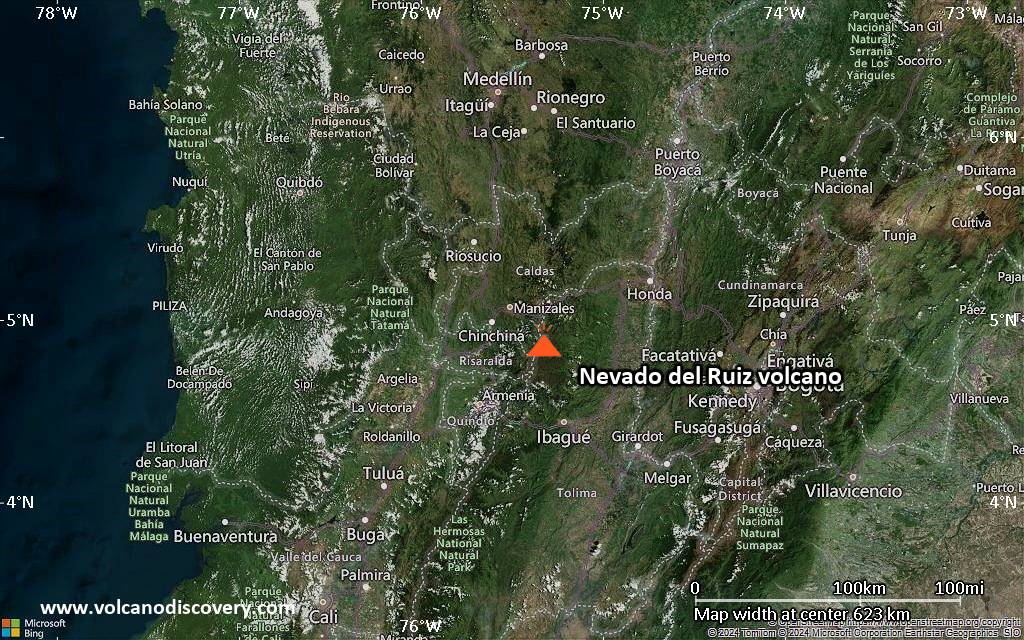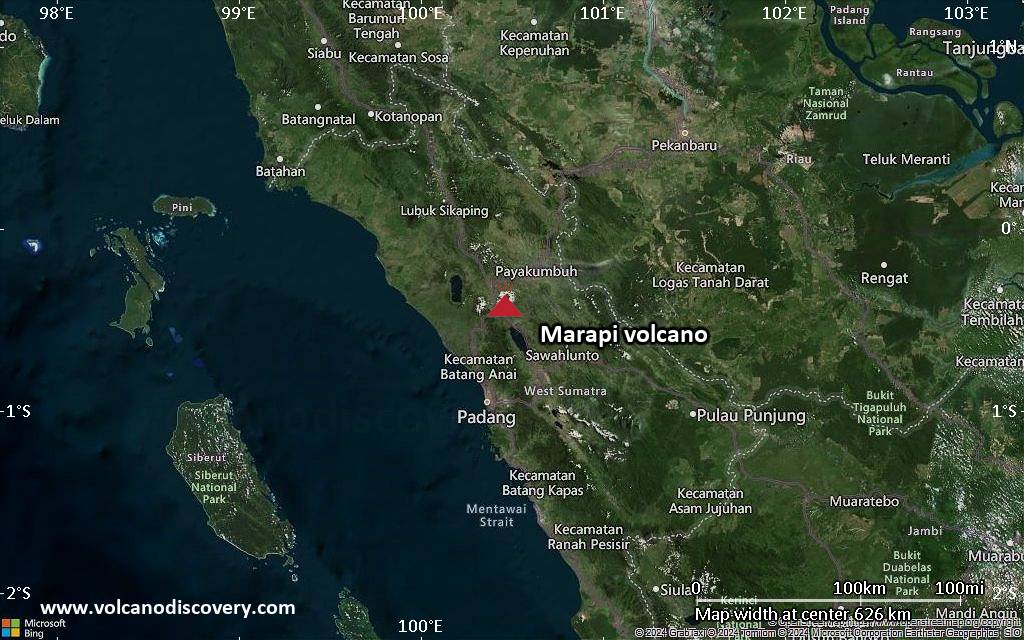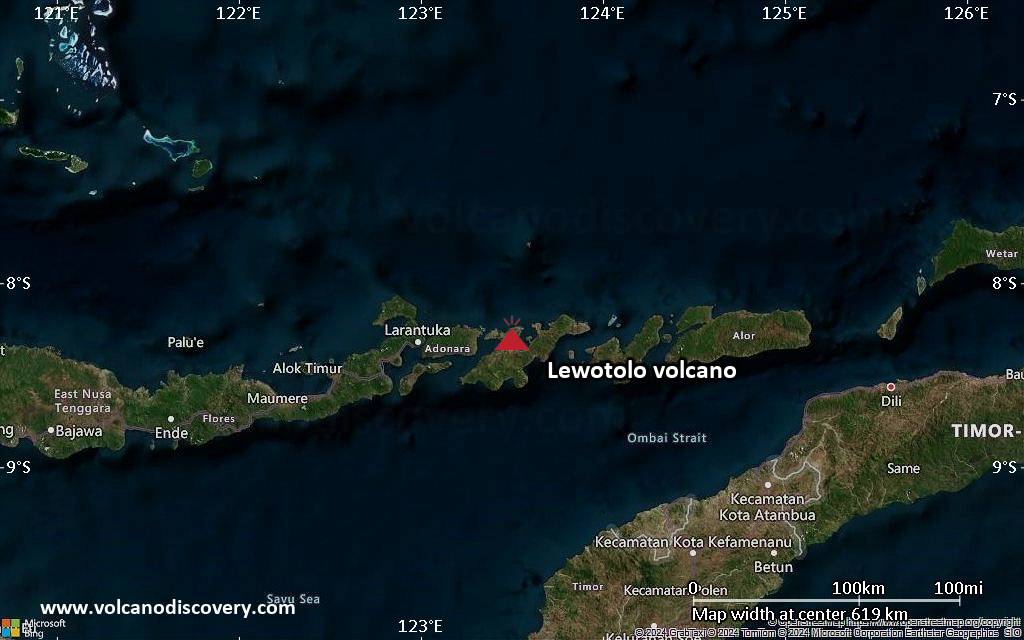On 17/01/2026, a forest fire started in Chile, until 18/01/2026.
Nevado del Ruiz Volcano Volcanic Ash Advisory: VA EMS REPORTED to 18000 ft (5500 m)

Explosive activity continues. Volcanic Ash Advisory Center (VAAC) Washington warned about a volcanic ash plume that rose up to estimated 18000 ft (5500 m) altitude or flight level 180 .
The full report is as follows:
FVXX21 at 09:06 UTC, 18/01/26 from KNES
VA ADVISORY
DTG: 20260118/0903Z
VAAC: WASHINGTON
VOLCANO: RUIZ 351020
PSN: N0453 W07519
AREA: COLOMBIA
SOURCE ELEV: 17319 FT AMSL
ADVISORY NR: 2026/006
INFO SOURCE: GOES-19. NWP MODELS. SERVICIO
GEOLOGICO COLOMBIANO.
ERUPTION DETAILS: VA EMS REPORTED
OBS VA DTG: 18/0840Z
OBS VA CLD: SFC/FL180 N0455 W07519 – N0443 W07512
– N0441 W07518 – N0455 W07522 – N0455 W07519 MOV
SE 10KT
FCST VA CLD +6HR: 18/1430Z SFC/FL180 N0455 W07518
– N0441 W07511 – N0438 W07517 – N0453 W07520 –
N0455 W07518
FCST VA CLD +12HR: 18/2030Z SFC/FL180 N0455
W07518 – N0440 W07515 – N0439 W07520 – N0455
W07520 – N0455 W07518
FCST VA CLD +18HR: 19/0230Z NO VA EXP
RMK: VA EMS REPORTED BY VONA. VA FL/DIR BASED ON
RPRT AND MDL GUIDANCE. HOT SPOT OBSD IN SAT. NWP
MDL FCST SLIGHTLY VEERING THRU T+12HRS. …ZENG
NXT ADVISORY: WILL BE ISSUED BY 20260118/1500Z
Sangay Volcano Volcanic Ash Advisory: VA PLUME OBSD to 21000 ft (6400 m)

Explosive activity continues. Volcanic Ash Advisory Center (VAAC) Washington warned about a volcanic ash plume that rose up to estimated 21000 ft (6400 m) altitude or flight level 210 .
The full report is as follows:
FVXX22 at 08:45 UTC, 18/01/26 from KNES
VA ADVISORY
DTG: 20260118/0843Z
VAAC: WASHINGTON
VOLCANO: SANGAY 352090
PSN: S0200 W07820
AREA: ECUADOR
SOURCE ELEV: 17342 FT AMSL
ADVISORY NR: 2026/063
INFO SOURCE: GOES-19. VONA. NWP MODELS.
GEOPHYSICAL INST.
ERUPTION DETAILS: VA PLUME OBSD
OBS VA DTG: 18/0820Z
OBS VA CLD: SFC/FL210 S0159 W07820 – S0201 W07819
– S0214 W07839 – S0210 W07841 – S0159 W07820 MOV
SW 10KT
FCST VA CLD +6HR: 18/1430Z SFC/FL210 S0159 W07820
– S0201 W07818 – S0216 W07845 – S0211 W07847 –
S0159 W07820
FCST VA CLD +12HR: 18/2030Z SFC/FL210 S0159
W07820 – S0201 W07818 – S0215 W07847 – S0210
W07849 – S0159 W07820
FCST VA CLD +18HR: 19/0230Z SFC/FL210 S0158
W07820 – S0200 W07818 – S0219 W07838 – S0215
W07841 – S0158 W07820
RMK: VA CLDS OBSD IN SAT EXTDG APPX 25 NM SW FM
SUMMIT. VONA RECEIVED. NWP MDL FCST SW WINDS THRU
T+18HRS. …ZENG
NXT ADVISORY: WILL BE ISSUED BY 20260118/1445Z
Marapi Volcano Volcanic Ash Advisory: VA TO FL120 REPORTED MOV E OBS VA DTG: 18/0410Z to 12000 ft (3700 m)

Explosive activity continues. Volcanic Ash Advisory Center (VAAC) Darwin warned about a volcanic ash plume that rose up to estimated 12000 ft (3700 m) altitude or flight level 120 .
The full report is as follows:
FVAU04 at 04:30 UTC, 18/01/26 from ADRM
VA ADVISORY
DTG: 20260118/0430Z
VAAC: DARWIN
VOLCANO: MARAPI 261140
PSN: S0023 E10028
AREA: INDONESIA
SOURCE ELEV: 2885M AMSL
ADVISORY NR: 2026/13
INFO SOURCE: CVGHM HIMAWARI-9
ERUPTION DETAILS: VA TO FL120 REPORTED MOV E
OBS VA DTG: 18/0410Z
OBS VA CLD: SFC/FL120 S0024 E10024 – S0017 E10027 – S0018
E10134 – S0051 E10127 MOV E 20KT
FCST VA CLD +6 HR: 18/1010Z NO VA EXP
FCST VA CLD +12 HR: 18/1610Z NO VA EXP
FCST VA CLD +18 HR: 18/2210Z NO VA EXP
RMK: CVGHM REPORTED ERUPTION TO 300M ABV SUMMIT AT 18/0351Z.
VA NOT IDENTIFIABLE ON LATEST SAT IMAGERY DUE TO MET CLOUD.
VA IS EXPECTED TO DISSIPATE WITH 3-6HRS. HEIGHT AND MOV
BASED ON MODEL GUIDANCE AND VONA.
NXT ADVISORY: NO LATER THAN 20260118/1030Z=
Lewotolo Volcano Volcanic Ash Advisory: VA TO FL060 REPORTED MOV ENE AT 18/0147Z EST VA DTG: 18/0150Z to 6000 ft (1800 m)

Explosive activity continues. Volcanic Ash Advisory Center (VAAC) Darwin warned about a volcanic ash plume that rose up to estimated 6000 ft (1800 m) altitude or flight level 060 .
The full report is as follows:
FVAU03 at 02:07 UTC, 18/01/26 from ADRM
VA ADVISORY
DTG: 20260118/0207Z
VAAC: DARWIN
VOLCANO: LEWOTOLOK 264230
PSN: S0816 E12330
AREA: INDONESIA
SOURCE ELEV: 1423M AMSL
ADVISORY NR: 2026/27
INFO SOURCE: CVGHM, HIMAWARI-9
ERUPTION DETAILS: VA TO FL060 REPORTED MOV ENE AT 18/0147Z
EST VA DTG: 18/0150Z
EST VA CLD: SFC/FL060 S0820 E12325 – S0810 E12323 – S0737
E12422 – S0756 E12440 – S0819 E12434 MOV NE 25KT
FCST VA CLD +6 HR: 18/0750Z NO VA EXP
FCST VA CLD +12 HR: 18/1350Z NO VA EXP
FCST VA CLD +18 HR: 18/1950Z NO VA EXP
RMK: CVGHM REPORTED VA TO 400M ABV THE SUMMIT AT 18/0147Z.
VA NOT IDENTIFIABLE ON SAT IMAGERY DUE TO MET CLOUD. VA IS
EXPECTED TO DISSIPATE WITHIN 6HRS. HEIGHT AND MOV BASED ON
GROUND REPORT AND MODELS.
NXT ADVISORY: NO LATER THAN 20260118/0807Z=
